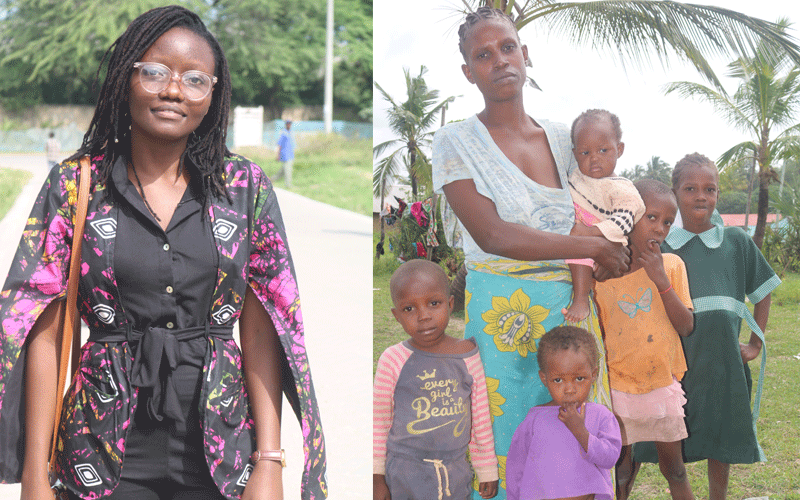Years of poverty and violence made home a living hell

Jasmine Atieno @sparkleMine
The recent rise in teenage pregnancies is an actual depiction of the equal rise of the paedophiles walking free in the society.
The most vulnerable are those from poor family backgrounds, who unfortunately end up getting married to their defilers in order to escape the burden of single motherhood while the abusers use this to avoid facing the justice system.
This sets in motion a cycle of child abuse, where girls give birth to children whom they have no ability to care for, the requisite capacity to handle a marriage and family or the will to walk out and get a life away from the abuser.
This is the story of Sidi Kahindi, a 25-year-old mother of five, a resident of Majaoni in Mombasa. Sidi did not attend school and was married off when she was 13.
When she got married she already had a child by a different man. And since the man was willing to accept her and the child, it seemed like a fair deal.
But this was not to be the case. Every hell door broke loose when she gave birth to their first child.
Immediately after being discharged from the hospital, her husband was demanding for sex, but since she had not healed, she denied him.
This only angered the husband who turned his frustrations to the newborn, canning her using a little makuti stick.
After this, he raped Sidi. That was just the beginning of her unending abusive marriage of nearly 10 years.
“I remember I went to hospital for treatment and also take my daughter for postnatal clinic.
The nurse asked me to undress the baby and she was in shock and furious when she saw her.
When I said it was the father who had beaten the infant and raped me, they called the police on me.
After this, a lady who brought me to the station offered to live with me and my daughter until I could get myself together.
But a couple of days later, she offered me Sh5,000 in exchange for my child. I told her I could not do it. So she asked me to leave her home,” narrates Sidi.
Sidi had no choice, but to go back to her mother’s home in Utange, Mombasa. Things were not easy here either, but it got worse when her husband found out her whereabouts and came for her.
You see the Mijikenda culture, she says, binds a woman to her marriage. Before you are married off, you are made to understand that no matter what happens, you belong to your husband. So her parents decided she had to go back.
She has since lived through rape, hungry days and nights while the children would in some days lick salt and go to sleep.
“He makes our children watch while he forcefully defiles me. He walks completely naked in the house—he is not afraid of what he is exposing them to.
When they ask for food, he tells them to eat his manhood, and worse are the insults towards the children even before their friends’ eyes.
Nobody wants their children playing with mine because of his abusive nature. I need help to get them and myself away from him,” she says amid tears.
Sidi reached out to Elizabeth Kadzo Ziro, a teacher at Utange Primary School where her daughters also attends school about a month ago. Her husband was arrested, but is out on bond.
“Out of the five children being abused by their biological father, three have been rescued,” shares Elizabeth.
According to Jolline Katama, a child protection law specialist, sexual abuse has its roots in male chauvinism that built its foundation in the Mijikenda tradition.
“The most unfortunate thing is that, women in our community have been oppressed to a point of hopelessness.
The ideal relationship between the traditional man and woman would be that, the woman does the toiling in the field, the children take care of the livestock if any, the husband stays at home or loiters around in drinking sprees and comes back home to demand food and conjugal rights from an overworked and drained wife.
Failure to render servitude leads to physical abuse, sometimes of both the wife and children… And in some cases sexual abuse.
Cases of sexual abuse, such as marital rape and defilement are spoken of and often settled within families, which is wrong,” says the lawyer.












